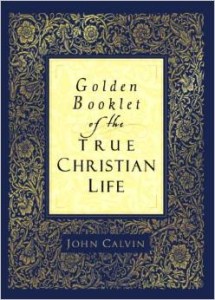 Based in Geneva, Switzerland, John Calvin became one of the most influential Protestant theologian and pastor of the Reformation. Born in Noyon, France in 1509, Calvin joined the Reformation at an early age after studying to become a humanist lawyer. At twenty-six, he published the first edition of his “Institutes of the Christian Religion” which established him as a major player in the Reformation movement. The “Golden Booklet of the True Christian Life” booklet was published both separately and as part of later editions of the “Institutes of the Christian Religion.”
Based in Geneva, Switzerland, John Calvin became one of the most influential Protestant theologian and pastor of the Reformation. Born in Noyon, France in 1509, Calvin joined the Reformation at an early age after studying to become a humanist lawyer. At twenty-six, he published the first edition of his “Institutes of the Christian Religion” which established him as a major player in the Reformation movement. The “Golden Booklet of the True Christian Life” booklet was published both separately and as part of later editions of the “Institutes of the Christian Religion.”
The booklet itself is divided into five chapters cover different areas of the Christian life. Chapter one talks about the humble obedience of a believer in submitting themselves to the Scriptures and seeking a life of holiness. This life is one that goes beyond external trapping of the faith and touches the inside of a believer. As Calvin puts it, “the gospel is not a doctrine of the tongue, but of life” (page 20). To this end, the believer is to always be pushing in and trying to move further along the journey of the faith.
Chapter two builds upon this humility by expounding upon the concept of self-denial, i.e. the life of a believer is no longer their own but belongs to God. To me, this was the best chapter within the booklet as it captured the concept of living for Jesus rather than trying to add Christianity on as just another activity. Instead Calvin tells us that if we are to follow God, then we must be willing to deny the inner most desires of our heart for that of the desires of Jesus. We are also to “voluntarily give up our rights for the sakes of others,” helping them whenever possible (page 35).
The third chapter looks at the concept of crossbearing and preparing oneself for a life that is “hard, difficult, laborious, and full of countless griefs” (page 47). While I disagree with Calvin’s premise that every hardship is ordinated by God (page 46), I do agree with his encouragement to persevere through hardship for the glory of God. All too often Christianity is presented as a way of life that is easy with no troubles. The opposite is true as the cross begs us to “partake of the sufferings of Christ” (page 48).
 Chapter four shifts gears a bit and encourages the believer to stay hopeful for the coming of Christ and the New Heaven and Earth. By focusing on the Age to Come, the believer may embrace the self-deny of the cross while overcoming the hardships of this world. “The cross of Christ triumphs only in the hearts of believers over the devil and the flesh, over sin and wickedness, when they life their eyes to behold the power of the resurrection” (page 81). Sadly enough, Calvin uses this chapter to despise the present world and age in which humanity lives in. At one point he even promotes a form of Gnosticism which sets up a dualism between the spirit and the body (page 75).
Chapter four shifts gears a bit and encourages the believer to stay hopeful for the coming of Christ and the New Heaven and Earth. By focusing on the Age to Come, the believer may embrace the self-deny of the cross while overcoming the hardships of this world. “The cross of Christ triumphs only in the hearts of believers over the devil and the flesh, over sin and wickedness, when they life their eyes to behold the power of the resurrection” (page 81). Sadly enough, Calvin uses this chapter to despise the present world and age in which humanity lives in. At one point he even promotes a form of Gnosticism which sets up a dualism between the spirit and the body (page 75).
The last chapter of the booklet deals with practical life items in that Calvin seeks to promote the concept of moderation. In a lot of ways this chapter is counteracting potential extremes that readers may have picked up from the previous chapter. To counteract this, Calvin writes “even if this earth is only a vestibule, we ought undoubtedly to make such a use of its blessings that we are assisted rather than delayed in our journey” (page 84). In order to avoid the extremes of being held captive by the blessing of this life or by denying them totally, Calvin seeks to lay out some “general principles for the lawful use of earthly things” as seen in the Scriptures (page 85). These principles follow the basic outline that all things are gifts from God and are to be used in moderation to help the believer on their journey toward heaven.
Overall there are some great points and concepts within Calvin’s “Golden Booklet of the True Christian Life.” At the same time, there are some key items missing from the booklet. Namely Calvin doesn’t address the battle motifs of the Scripture, choosing instead to claim that all hardships are from God rather than from the evil one or as a result of sin in the world. This is a huge hole in the booklet as it sets God up to be the author or, at the very least, the promoter of evil. To me, there is a big difference between what is permitted and what is ordinated, which is why I do not agree with John Calvin or the Reform tradition he started.
